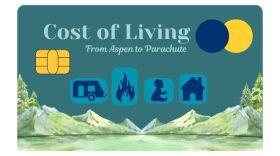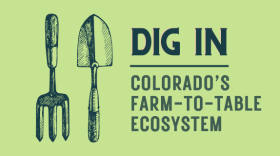-
Across the U.S. women are having fewer children -- or not having them at all. Reporter Sarah Tory explores how that trend is playing out in the Roaring Fork Valley, as the rising cost of living, housing and childcare challenges, and shifting priorities push many women to rethink motherhood. In this series, three women talk about how they're navigating the decision.
-
As inflation spikes, real estate prices climb and essential services become more expensive or difficult to find, Aspen Public Radio explores how a rising cost of living impacts residents of the Roaring Fork and Colorado River valleys. This series is supported by a grant from United Way of Eagle River Valley.
-
Support for this Nonprofit Spotlight series comes from the Aspen Community Foundation, with a mission to inspire philanthropy and ignite collaborative action that leads to community-led change.
-
Some of the industries in the Roaring Fork and Colorado River valleys are launching sustainability initiatives. In this three-part series, Aspen Public Radio reporters consider the impact of several programs from aviation, housing, and oil & gas companies.
-
Deferred Action for Childhood Arrivals (DACA) gives temporary protection and work permits to undocumented immigrants who arrived in the U.S. as children. Several DACA recipients, who grew up in the Colorado River Valley received federal travel permits to return to Mexico, where they were born. In this three-part series, these DACA holders grapple with the risks and benefits of international travel, and connect with their origins.
-
Traffic is a regular part of all of our lives in the Roaring Fork Valley, as so many people travel regionally to work, to run daily errands, and to get to the mountains. And transportation, namely cars, is the single largest source of greenhouse gas emissions in Colorado, and in our valley, making our car-dependent culture not just a quality of life issue, but an environmental one as well. In this three-part series, reporter Caroline Llanes looks at the ways traffic has changed (and stayed the same) here in our community, and the ways we can get out of our cars and get around in ways that work better for our lives and the environment.
-
In the Roaring Fork Valley, and well beyond it, farm-to-table restaurants are telling stories about the meals they serve, in hopes that diners will leave with a greater appreciation for the people who grew that food.The concept isn't new, but it continues to earn awards and recognition, both for the flavor of the food and the ideas behind it. In this three-part series, reporter Kaya Williams digs into the purpose and impact of locally-sourced menus — then considers whether farm-to-table has gone mainstream.
-
Over a hundred new immigrants, mostly from Venezuela, arrived in the Roaring Fork Valley in the fall of 2023. In this three-part series, several new arrivals share stories about leaving their homes in Venezuela, traveling to the U.S., and starting a new life in Colorado.
-
A four-part series looking at the impacts of human-caused climate change in the Roaring Fork Valley and the community members dedicating their lives to mitigating the impacts.
-
"Lift Lines" is a series from Aspen Public Radio that shares the joys of winter sports, broadcast throughout the week as part of our morning ski report. Reporter Kaya Williams brings her microphone to the chairlifts, gondolas and trails of the Roaring Fork Valley to ask people why they love sliding on snow.
-
All Things Considered host and reporter Halle Zander looked into Spanish-language emergency alerts in the Roaring Fork Valley’s three counties—Pitkin, Garfield, and Eagle—and compared the level of communication services that different agencies offer during disasters.
-
This two-part series, a collaboration between Aspen Public Radio and Aspen Journalism, looks at the impacts of COVID-19 across six Western Slope counties, including Pitkin, Eagle, Garfield, Mesa, Delta, and Gunnison. Challenges for healthcare providers included dealing with a transient community, staffing issues, and public angst. And death rates varied between rural and resort counties.
-
Climate change is becoming more apparent here in the Roaring Fork Valley. From smoke to drought, we're still understanding how it all affects our community. But how do trees fit into the big picture? Our news team is trying to answer that question by examining the unique relationship between our valley's trees and the climate crisis. Support for In the Woods comes from The Longview Foundation of Minnesota.

Play Live Radio
Next Up:
0:00
0:00
Available On Air Stations













